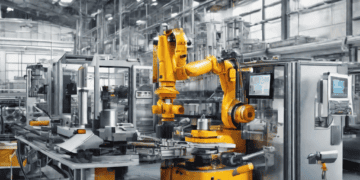Manufacturers in sectors like automotive and electronics are undergoing significant digital transformation with the adoption of Industry 4.0, leading to faster and more sustainable changes.
Over the past decade, companies across various industries have faced increasing levels of disruption due to evolving customer preferences, demand uncertainties, and global challenges. National security concerns, trade barriers, logistics disruptions, and environmental considerations have prompted businesses to explore alternatives to globalized supply chains. Addressing these challenges, advanced industry (AI) companies are turning to Industry 4.0 to achieve agility, sustainability, speed, customization, and enhanced customer satisfaction.
The Global Lighthouse Network (GLN), a collaboration between the World Economic Forum and McKinsey, has identified 103 sites worldwide as “lighthouses,” showcasing successful Industry 4.0 transformations. These companies leverage digital technologies to build agile, customer-focused organizations, addressing five key areas of impact: sustainability, agility, speed to market, customization, and customer satisfaction.
Challenges in Industry 4.0 adoption Despite the success of lighthouse sites, a 2020 McKinsey survey of over 800 businesses globally identified three major challenge areas hindering broader Industry 4.0 adoption: financial hurdles, organizational issues, and technology roadblocks.
Financial hurdles involve the high costs associated with scaling digital deployments that lack short-term benefits. Organizational problems often stem from low leadership buy-in and insufficient knowledge of digital capabilities. Technology roadblocks include limited support from partners and challenges in selecting appropriate platforms.
Successful transformations: Key factors Examining advanced manufacturing lighthouses reveals two critical factors contributing to their success: selecting the right use cases and finding synergies between these use cases.
Industry 4.0 adoption and impact The GLN, which started with 16 sites in 2018, has grown to include 103 sites by 2022. Nearly 60% of these lighthouses are AI companies, showcasing the positive impact of Industry 4.0 on key performance indicators (KPIs) related to sustainability, productivity, agility, speed to market, and customization.
Popular use cases in AI companies Flexible automation, digital performance management, quality analytics, and AI-based inspections are among the most popular use cases in AI companies. These use cases have demonstrated significant impact on KPIs, driving growth and efficiency.
Synergistic use cases for greater impact Lighthouse companies often employ multiple use cases simultaneously, creating synergies that result in greater impact. For example, combining flexible automation, digital performance management, and quality analytics allowed an automotive factory to reduce warranty incidents by 50%, increase flexibility, and cut manufacturing costs by over 10%.
Embarking on the Industry 4.0 journey AI organizations aiming to embrace Industry 4.0 can learn from successful lighthouse sites. By strategically deploying digital technology across effective use cases, companies can achieve outsized impact on various KPIs. Industry 4.0 adoption at scale enables organizations to navigate current disruptions and prepare for future challenges.
Find the latest supply chain report news at The Supply Chain Report. For international trade tools, see ADAMftd.com.
#Industry4.0 #DigitalTransformation #AdvancedManufacturing #AICompanies #GlobalLighthouseNetwork #Sustainability #Agility #SpeedToMarket #Customization #CustomerSatisfaction #FlexibleAutomation #DigitalPerformanceManagement #QualityAnalytics #AIInspections #SupplyChainInnovation #ManufacturingEfficiency #TechAdoption #BusinessAgility #SustainableManufacturing #DigitalTechnology #FutureOfIndustry #LighthouseSites #McKinsey #WorldEconomicForum #AIAdoption #IndustrialRevolution #SmartManufacturing















